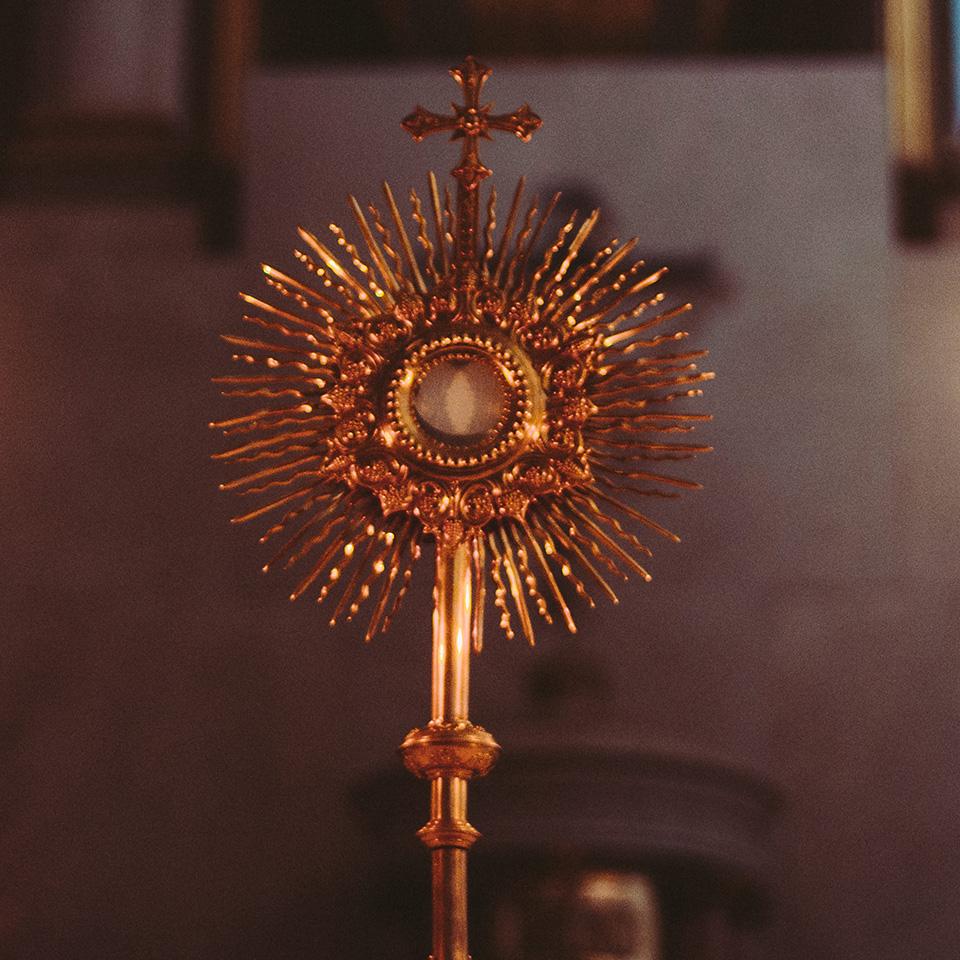Easter 2020: what a strange season this is. In this time of the coronavirus, not just our domestic but also our devotional and liturgical routines have been shaken up. Lent is past, but it seems that we are still in the desert. We could not attend the most sacred celebrations of the Triduum in person, but prayed and knelt and sung in our separate homes, alone or with a few family members. If we joined in a live-streamed Mass, we saw presented to us the Body of Christ, which we could not receive. Spiritual communion, once either merely theoretical or totally unknown to many Catholics, for now is our reality. But what does it mean? Are we deprived of divine grace? Are we left hungry when most we need nourishment?
As I reflected on this question on Easter Sunday itself, I found myself asking, “Where are you, Lord?” And as I asked, I found myself returning in thought to the liturgy of the Mass itself, and finding there a response. The result was this poem: an invitation to meditate on our own longing, to offer our questions and our fears to Our Lord, and to listen for his answer . . .
Spiritual Communion
In every tabernacle of the world is found
A royal treasure: God Himself, of kings the King
In humblest form, a merest wafer, white and round.
So great a gift, that he would come to us, and bring
His grace, his body, blood, his soul, divinity,
To enter our own very selves, that we might cling
To him in deed. When most we need a remedy,
In isolation, sad, we long, each drawn-out day,
To have the Bread of Life, in truth, which now we see
But cannot eat. The sanctuary doors are shut. The way
Is closed. “O Key of David, why are you shut in?
You cried to Lazarus, Come out! What do you say?”
Or do you wait in silence, that we might begin
To admit you to our fears and hopes, to ponder
Our own need, see it, touch it, know it deep within.
“I am not worthy, Lord, that you should come under
My roof. Then, do not come: but say the word—my soul
Shall be healed.” We share now in the servant’s wonder:
Though none (in person) came to help, he was made well.
His master sought a blessing and the very Word
Healed him at once, unchecked by distance, guard, or wall.
Let us now share that soldier’s faith, to ask the Lord
(More boldly still) to heal us all in union with
The Sacrament on every altar of the world.
You give your real presence there, O Lord. Now give
Yourself—if not into our mouths—into our hearts
Who cannot come to you. Who open up their love.
***
A poem can be a prayer, and it can lead to prayer. It does not impose, but invites. Perhaps you find something already that you wish to reflect on, or pray about. Perhaps you are still mulling things over, thoughts as yet unformed. Let me offer some further thoughts that, I hope, will aid in your reflection, and lead you to a richer and deeper experience of spiritual communion.
Now is a time given to us to ask ourselves if we have set conditions for Our Lord, allowing him into our lives only on our own terms and on our schedules. Perhaps he permits us to have our choices stripped from us, so that we might, like Lazarus, like the centurion’s servant, recognize our own total weakness and dependence.
The center of this poem is the fact that Our Lord Jesus Christ is really, truly, substantially present in the tabernacles of all the world. The most holy sacrifice of the Mass is taking place at altars all around the world. Even if we are not present at the Mass, he is present: upheld in the hands of his priests, Body, Blood, Soul, and Divinity.
Now is the time to put yourself into the place of Mary and Martha at the tomb of their brother Lazarus; of the centurion who boldly asked Jesus to heal his servant. Read Matthew 8:5-13. We say the centurion’s words at every Mass. But the words “my soul” replace the centurion’s words “my servant.” Reflect on that: the Church is inviting you, in the very words of the most sacred liturgy, to identify yourself at the deepest level with both the centurion and his servant. Lord, I am not worthy that you should enter under my roof, but only say the word, and my soul shall be healed.
***
A few notes for the literary-minded: in this poem, I have used the form called “terza rima,” in which there are interlocking rhymes from stanza to stanza; this gives a connectedness to the poem, allowing it to flow from one thought to the next, just as in prayer, our thoughts move from one idea to the next, sometimes before we even realize it. (It is the form used by Dante in the Divine Comedy, incidentally.) It is, therefore, an invitation in its form as well as its content to see the connections between our experiences; to find the unexpected threads of meaning woven into what seems to be a jumble of confusing, conflicting thoughts.
I have used the same meter as found in the first line of the Eucharistic hymn “Adoro Te Devote. (You can find the Latin text of the hymn, as well as an English translation, here; it is well worth your meditation. There are also many audio recordings that you can find on YouTube.) This hymn was composed by St. Thomas Aquinas for the feast of Corpus Christi; this is a deliberate allusion to the Eucharist that is hidden, as it were, behind all the words of the poem.

